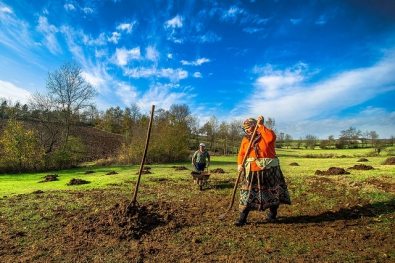We are glad to echo a news that highlights the strength that Family Farming is acquiring in Eastern Europe, and is that Macedonia has officially formed its NCFF and one of its first steps has been the elaboration of a study of characterization of Family Farming (In Macedonian) in the country.
We also share the news from the Slovak Rural Platform (equivalent to the National Committee of Family Farming – NCFF), which after an intense process, has achieved constitutional protection of the lands of Slovakia against speculative acquisitions, thanks to the constitutional law draft approved by the parliament on 16 May.
SLOVAK RURAL PLATFORM SUCCEEDS IN AMENDING THE CONSTITUTION TO PROTECT THE LAND
Boglarka Ivanega and Lucia Gallová
Bratislava, 10 July, 2017.- Slovak land is on the right road to be protected from land speculation by a constitutional amendment which should enable land protection and favourable conditions for young and small farmers and the environment. The amendment, approved by the Slovak parliament on May 16, 2017, is the result of a complex, strategic participatory process initiated and spearheaded by the Slovak rural platform (RP) since the spring of 2016.
The problem
Land in Slovakia is very fragmented. High number land co-owners is typical for the country, the average number of co-owner shares per one plot is 11.11 (Urban, 2013). In some cases, plots are only 2m wide, but 700 m long but there are many cases in which merely a square meter of land is owned. What’s more, individual owners have their land scattered throughout the whole cadastral area and extreme fragmentation of land is very common, which leaves little space for a meaningful usage as they are not accessible, oftentimes located in the midst of large agricultural units with the high number of co-owners prevents selling or renting (Bažík, Muchová, 2015). This is in part due to inheritence laws from the times of Maria Theresia of the Austro-Hungarian Empire, in which land was inherited and divided amongst all the children of the land owner equally. Over the past 13 years, merely 12% of the land has been consolidated.
Furthermore, up to 90% of agricultural land in Slovakia is rented, but there is no formal obligation to register lease contracts nor usage. Therefore in many occasions we don’t know who manages the land, up to the point where even local authorities are unaware of who manages the land within their territory.
From a macroeconomical point of view, the country imports foodstuff worth euro 1 billion. Yet at the same time Slovakia exports of lot of its primary production like cereals, leaving added value in the form of employment and rural development abroad. In this complicated labyrinth of land right issues it is proving incredibly hard for young farmers to access land and begin farming.
In the first step though, land had to be defined, since the word land wasn’t even included in the constitution. Along with the inclusion of land in the constitution, the goal of the initiative has been to achieve that land should be owned by natural persons, preferably Slovak citizens. This is an important step, since if the land is owned by a legal person it is very hard to track down the owner as well as the activities to be realized in the given area. This is the first step to end with suspicious land speculations. On the other hand, it is lays down the base for an enabling environment in which small and family farmers could acquire land as well.
The process
After an agreement between all the members of the RP to initiate the process, RP’s joint vision for land protection in the constitution was communicated to a lawyer firm who prepared a legal proposal. It was then consulted with other relevant agricultural organisations, who began to support the initiative. Following this all political parties were contacted and the proposal was negotiated with all of them, excluding the radical far-right party. Then the RP prepared a public discussion during an agricultural conference after which one national governmental party began an intensive communication with the RP. Afterwards, the Ministry of Agriculture organized two roundtables until the RP reached a common agreement supporting land protection. After all this process, the RP made interviews and wrote blogs about the topic, communicating it at a political level and prepared a public round table presenting common public statements. And finally, after one year of hard work, 113 parliamentary representatives voted in favour of the constitutional amendment.
Outcome
As the result of RP’s effort, the constitution is changing in the following points: Land (both agricultural land and forest) is specified as a nonrenewable natural resource which has a special protection from the state and society. and in the constitution part about property, it is defined that land can be owned by the state, private owners and companies. The next steps will be changing specific laws and directives concerning the allocation of grants and subsidies, registry of tenancy agreements, land use rights, amend the law concerning land registry as well as Slovak Civil Code on issues of heritage.
Put simply, the fight for land is grave and the rules of the game are hidden in a hardly accessible legal language. The Rural platform has begun to take the first step to define land and terms of lease in the constitution. At the moment it is drafting two new law proposals that will be presented for approval in the fall. As shown, the process is very complicated but the Rural platform is encouraged by their achievements and will continue to work tirelessly to bring the voice of farmers to the negotiation table.
Más Información
- Related News:
- SLOVAK RURAL PLATFORM MEETS THE PRESIDENT OF THE SLOVAK REPUBLIC
- Parliament approves constitutional safeguards for land https://spectator.sme.sk/c/20534755/parliament-approves-constitutional-safeguards-for-land.html
Slovak farmland gains constitutional protection https://spectator.sme.sk/c/20553541/slovak-farmland-gains-constitutional-protection.html



